Sixteen days after a military police officer killed Senegalese worker Ngagne Mbaye in the Brás district, São Paulo, Edineide Aparecida Rodrigues, a street vendor who used to work in the same area, was shot in the head in front of her house. Months earlier, she had testified to the Civil Police about a militia and extortion scheme at the Feira da Madrugada [Dawn Fair, in a rough translation] in Brás. She was a state-protected witness.
Three days after Edineide’s murder, a committee of street vendors formed from the protests against Ngagne’s death arrived at São Paulo City Hall. It was the eve of Workers’ Day and the meeting with the deputy mayor, Military Police Colonel Mello Araújo (Liberal Party), had been scheduled in advance. Of the group, with Brazilian nationals and immigrants, only four people were allowed in, only to be told that Mello Araújo had left. They left without an agreed-upon meeting date.
In Brás, a line of dozens of police officers forms and crosses Concórdia Square, their hands on their weapons. The uniforms are from the Military Police, but they are paid for by the city government. Under so-called Operation Delegada, they work for the municipality while off duty for the state government. A few meters ahead, tents are being dismantled at speed.
Unable to get out in time, a Black woman is surrounded by police officers. She notices the reporter’s camera, which inhibits the violence. Haughtily, she slowly puts the products on a trolley and leaves. On the corner, another woman sits on the ground and cries, saying she can’t take it anymore, that they – street vendors – can’t work and that her African friend was killed in front of her. That’s an ordinary day in Brás.
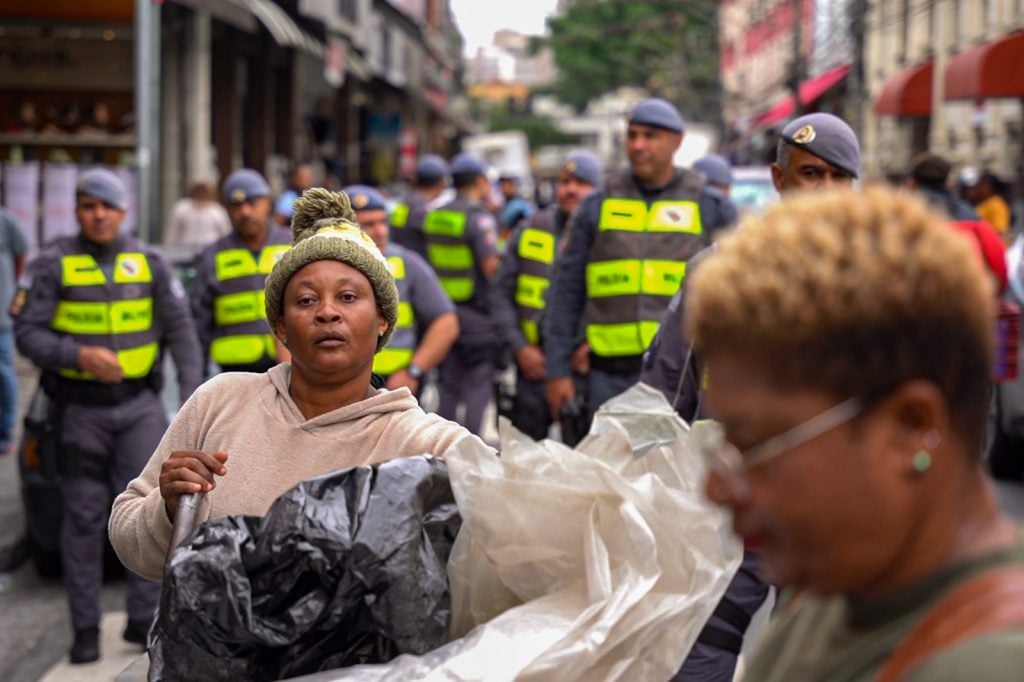
“Look at what [Mayor] Ricardo Nunes [Brazilian Democratic Movement] and [São Paulo] Governor [Tarcísio de Freitas, Republicans Party] are doing. What dirty politics, taking goods from the poor to resell them. It got worse after they shot the [Senegalese] guy. They’re running after us even more, pepper spray, gun in hand. The police are getting worse and worse,” says Rita Silva, a street vendor for 20 years. “How can a policeman come here holding a gun to a worker?” she says loudly, towards the officers.
“Brás is a pressure cooker. There’s a lot of money flowing through and it makes everyone work in fear of something,” says José Pedro Neto, a water vendor and member of the São Paulo Street Vendors Forum, linked to the Gaspar Garcia Center for Human Rights. “It’s a territory dominated by many forces and a lot of people profit from the work of others. Do you know what I mean?” he explains.
To BdF, vendors claim that the pressure has worsened despite the repercussions of Ngagne’s murder. Daily life, Pedro Neto summarizes, is a “minefield” between police violence and militia attacks. “Sometimes the police don’t take money from us, but they take it from the shopkeepers to stop us from working,” he explains. “Every hour someone claims to be the owner of the area,” he added.
The militia Edineide talked about
Edineide was one of the 25 witnesses whose testimony was the basis of the indictment that arrested three sergeants and a corporal of the Military Police in January for forming a criminal militia. They are Corporal José Renato Silva de Oliveira and Sergeants Wellington Stefani, Humberto de Almeida Batista and Lucia Ferreira de Oliveira.
According to the São Paulo Public Prosecutor’s Office (MPSP, in Portuguese), the street vendors had to pay the group up to BRL 300 (US$ 52.5) a week, in addition to the “luva”, a fee of around BRL 15,000 (US$ 2,629) to sell their products in that specific area. Those who couldn’t pay were forced to borrow from loan sharks. If payment was late, “collection” was made by police officers. According to the investigation, the main victims were immigrants.
“There was a time when the militia wanted us to pay. We didn’t pay, at least not in the area we used to sell our products. The police gradually got involved and when I found out, sections of the police were also getting paid. This went on and on. At one point they even sold the areas, the price rose and there was a complaint. Then it was in the press and that was that. From then on, it escalated and the police officers said we wouldn’t be allowed to work there,” explained Neto.
According to him, the violence practiced by police officers from Operation Delegada has been going on since 2023. One day, Pedro was approached by police officers who opened all his water bottles and poured the water on the ground in front of him. He decided not to sell his products in just one place, carrying them in his bag. “Before [this situation], I used to come back home with an average daily rate of BRL 200 (US$ 35). Today, I earn an average of BRL 50 [US$ 8.7], BRL 70 [US$ 12.2]. It’s very uncertain,” he says.
“Here in [Largo da] Concórdia, we’ve managed to fight off the militia, but in other streets, people have to pay. Here we work really hard and there are police officers who, if they don’t like you, they target you and don’t let you work,” says Laís*, who sells underwear, socks and umbrellas.
“Some workers are persecuted for opposing the police’s abuse of authority. There’s racism, xenophobia: when you go against all of this, you’re either psychologically or physically abused,” said the 27-year-old saleswoman.
City Hall expands Operation Delegada
Created in 2012 by Gilberto Kassab (Social Democratic Party) during the administration that also inaugurated the militarization of São Paulo’s subprefectures, Delegada Operation has grown under the Nunes administration.
In 2022, the agreement between the city hall and the state government offered 1,234 vacancies per day for military police. Today there are 2,400 – twice as many. In the first few months of 2025 alone, 210,320 vacancies were filled, according to the São Paulo mayor’s office. Police officers are paid BRL 355.36 (US$ 62.29) per 8-hour day. Officers receive BRL 426.40 (US$ 74.74).
Operation Delegada aims to curb street vending in downtown São Paulo. There alone, 1,500 police officers are deployed every day. In addition, the deputy mayors of these districts are also military police officers.
The Mooca subprefecture, which covers the neighborhood of the same name, in addition to Água Rasa, Belém, Brás, Pari and Tatuapé, is under the command of retired Military Police colonel Marcus Vinicius Valerio. Sé, which covers eight districts and has a BRL 137 million (over US$ 24 million) budget – the largest budget among the 32 subprefectures – is under Colonel Marcelo Vieira Salles (Social Democratic Party).
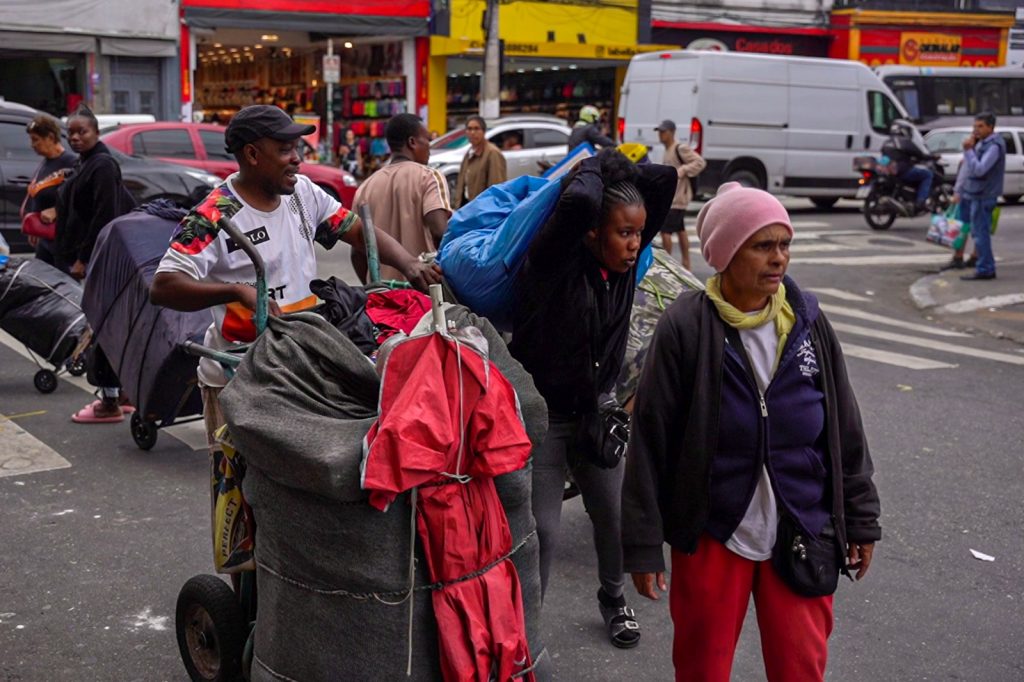
When asked about reports of violence and extortion by military police officers, the Public Security Secretariat of the Tarcísio (Republicans Party) government claimed that, regarding Operation Delegada, the responsibility lies with the city government. The latter, in turn, stated that “the behavior of police officers” is “reported directly to the Military Police Command”, linked to the state’s Public Security Secretariat.
According to the municipal administration, “the Mooca subprefecture reaffirms its commitment to the integrity and safety of citizens during the work of its teams and stresses that enforcement actions in the Brás region are accompanied by permanent guidance for street vendors on regularization procedures and authorized places to operate.”
‘Get out, trash’, ‘Go back to your country’: this is how Ketele Charles, a Haitian woman who has been selling men’s clothing on the streets of Brás since 2019, says she is treated by the police daily. For every piece of cloth she sells, she makes a profit of around BRL 3 (US$ 0.53). This is how she and her husband manage to support two children in Brazil and two others who are still in Haiti.
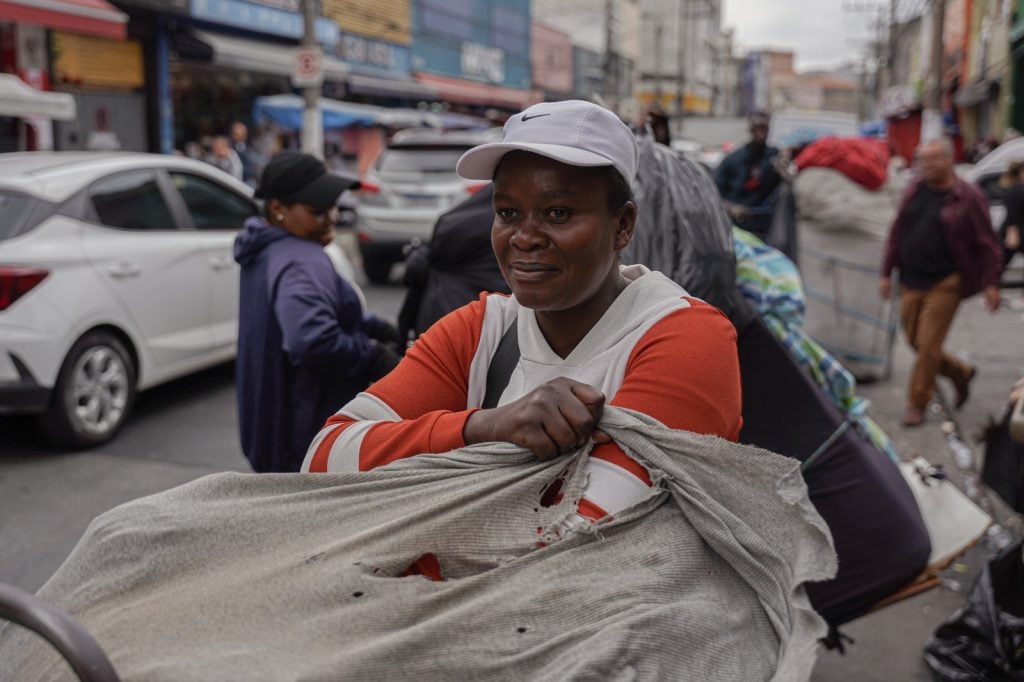
The city hall also said “All seized belongings are released upon proof that the goods are in good condition, with the presentation of the seal and invoice.”
This is not what happened to Laís. “The police seized my trolley and beat me up. So we ran. When we went to get back the goods, they refused to give them to us. I even had personal documents among the belongings they took from me. I filed a complaint with the ombudsman to go and collect my stuff. When I went to check, the goods were incomplete. They stole designer blouses, card machines,” she says.
“At the moment of seizure, they have to seal it in front of you and give you a seal so you can take it back. However, most of the time this doesn’t happen,” says Laís.
“Now, most people work running from the police. We’re on the run 24/7,” summarizes Laís. According to her, street vendors have difficulty acquiring the Term of Permission to Use (TPU, in Portuguese) and accessing the Tô Legal program, aimed at regularizing street vending in São Paulo. “Every street vendor wants to become a registered vendor, but that’s not offered to us,” she criticizes.
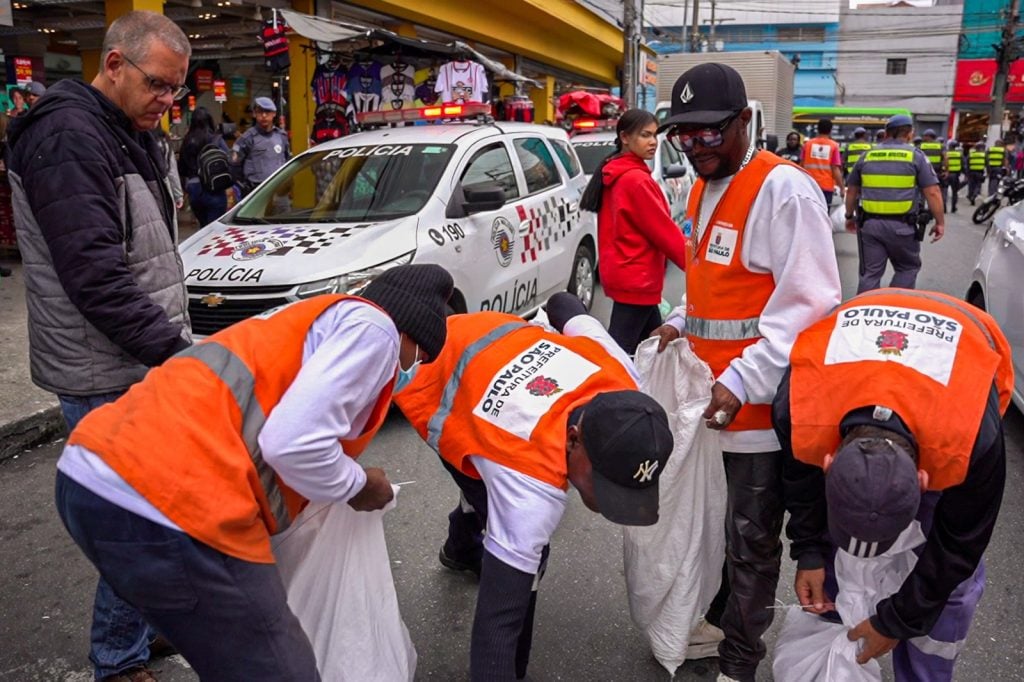
“They don’t keep their heads down”
Unhappy with the seizure of his products years ago, Senegalese street vendor Mamadou Ka learned the bureaucratic way to get them back. “I said ‘no’. Every day you have to look for your right. Here in Brazil, there has to be a law to get them back. Because I’m not committing a crime, I’m not stealing, I’m not doing anything wrong. I’m trying to work,” he says.
That’s how, over the years, he has become a reference among street vendors for help with such procedures. He was the person who managed to recover Ngagne Mbaye’s goods and hand them over to his family three weeks after his murder.
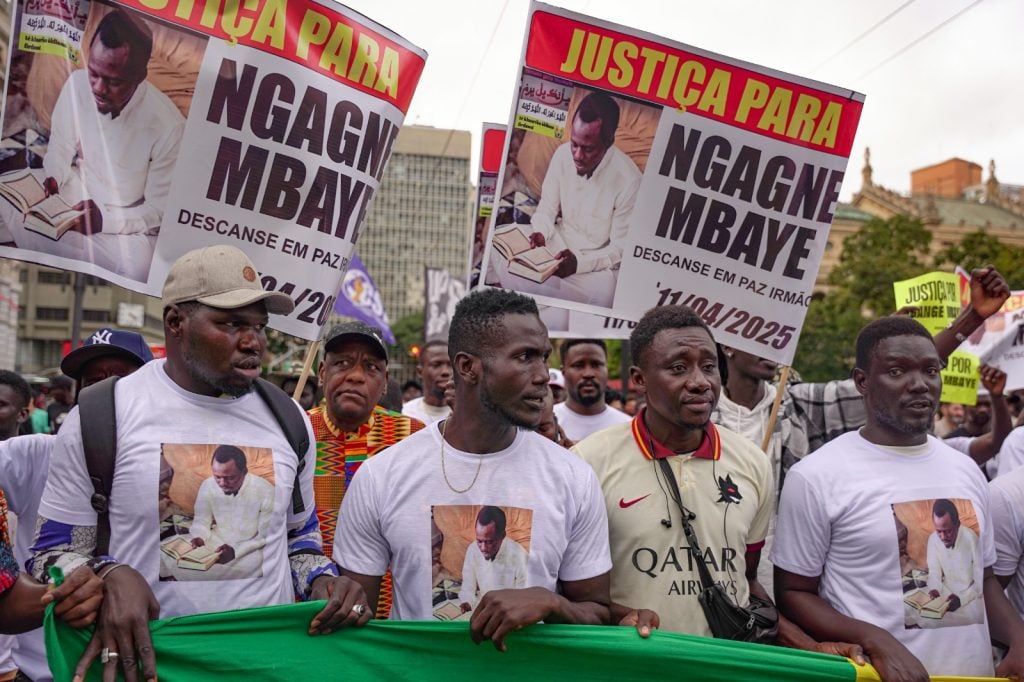
On April 11, Laís was near when Ngagne was assaulted by eight police officers who wanted to seize his products, which were locked on a trolley. He fought back with an umbrella handle, tried to run away and was fatally shot in the abdomen. “There’s a health center on that street. Nurses came to give him first aid, but the police prevented them from doing so. He died there being treated like garbage from start to finish. He was beaten, he suffered racism, xenophobia and he was killed,” she said.
Laís notices a difference in the way African immigrants face state violence. “Brazilians here keep quiet. When they see someone being attacked, they walk away. Africans, on the other hand, don’t accept police aggression and racism. They fight together. If they see a street vendor being attacked, they defend him. They are united, strong and courageous, which many Brazilians sometimes aren’t. You see your brother being beaten up by the police and you leave in fear. They [Brazilians] don’t even dare to record police actions. Africans dare to record it, to defend their brothers,” she says.
For Laís and Pedro, Ngagne’s death was “foretold.” “We’ve been to the Public Prosecutor’s Office, the ombudsman’s office, the subprefecture, city hall… And we kept saying: The worst is going to happen. Not because we have a crystal ball, but because we experience this kind of situation every day. There is oppression against people who need to work,” said Pedrinho, as he is known. “It can happen again at any time,” he warned.
*Her surname was not included to protect the source.




